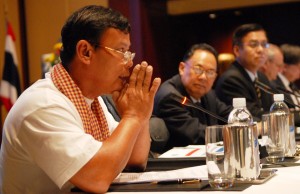Sun 5 Apr 2009
Cambodia/Thailand Dramas
Posted by Mary under ICBL, Travel
No Comments
My long-time colleague and friend Tun Channereth, who received the 1997 Nobel Peace Prize for the International Campaign to Ban Landmines (ICBL), greeted the opening and delivered the campaign’s statement to a regional meeting on the 1997 Mine Ban Treaty that I attended in Bangkok, Thailand on 2-3 April 2009.
Thailand’s Foreign Minister Kasit Piromya also spoke at the Bangkok Workshop opening and made a point of acknowledging the Cambodian delegation to before he left. This was in part because the day before he had been quoted as calling Cambodian’s Prime Minister Hun Sen a ‘thug.’ The minister claimed he had been mistranslated.
Piromya was appointed in late December after protests by the People’s Alliance for Democracy (PAD), which shut down Bangkok’s gigantic new airport in a ten-day siege. The minister has also been defending criticisms over Thailand’s abuse of hundreds of Rohingya migrants rescued in Indian and Indonesian waters in recent months.
As the workshop was opening, a Thai soldier stepped on a landmine while on patrol in the disputed area around Preah Vihear temple on the Cambodian border. He lost his left leg and shots were fired. When Thai soldiers went to investigate the blast scene the next day more shots were exchanged as well as rocket fire. AFP reported that one Thai and two Cambodian soldiers were killed.
The day before the workshop opened, we went on a field visit with the Thai military and mine action center to minefields in Sa Kaew on the country’s border with Cambodia. We stopped at Sdok Kok Thom temple, an 11th century Khmer temple that was demined in 2003.
We didn’t get questioned about the border incident; media was more interested in the campaign’s criticism of Burma, which is the only government believed to be using antipersonnel mines in the world today. In addition to its border worries, the government seemed concerned about its stance on the cluster bomb ban. Neither Cambodia nor Thailand have signed the 2008 Convention on Cluster Munitions.
Cambodian officials denied the mine was newly laid, but there was speculation at the meeting that the mine had been laid to divert attention away from the trial of Kaing Guek Eav, alias Comrade Duch the Tuol Sleng executioner, which opened in last week. My colleague Nic Dunlop, who found Duch was in Phnom Penh for the Khmer Rouge trial. Nic has just completed a documentary film on Burm, which includes extensive footage of the mine problem also shown in Disarm.
Thanks to Fred Lubang, Shushira Chonhenchob, Emilie Ketudat and the campaigners who attended the Bangkok Workshop.
* Hi-res photos from field visit and workshop.




No Responses to “ Cambodia/Thailand Dramas ”